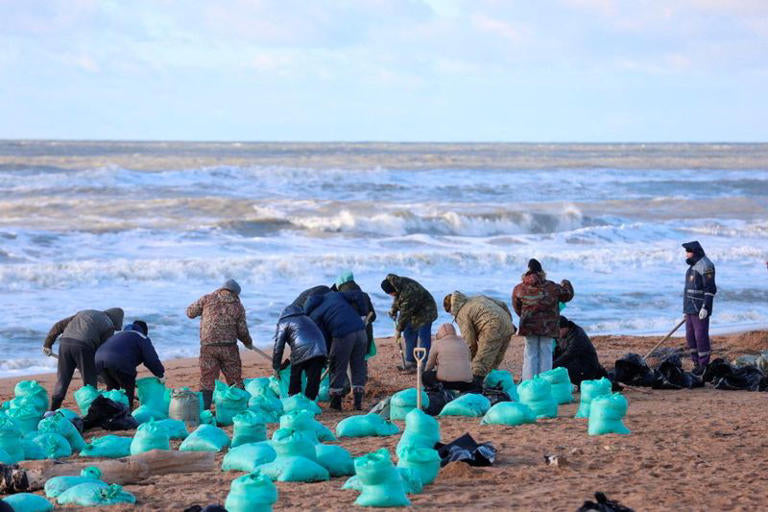
Russian Shadow Tanker Sinks in the Baltic: A Growing Environmental Threat
Ashton RouthierShare
Black Sea Oil Spill: A Devastating Ecological Disaster
An oil spill from two damaged tankers, part of Russia’s shadow fleet, has caused widespread devastation along Russia’s Black Sea coastline, marking one of the most severe ecological disasters the region has faced in recent years. The shadow fleet is a clandestine network of aging and poorly maintained vessels, often used to bypass international sanctions and transport oil and other commodities under minimal oversight. The spill has polluted a 49-kilometer (30-mile) stretch of sandy beaches near the resort city of Anapa, contaminating the air and threatening local wildlife.
The Scale of the Disaster
According to local authorities, the spill originated from two tankers damaged during a powerful storm in the Kerch Strait, a key waterway between mainland Russia and Crimea. The vessels, each over 50 years old, were carrying a combined total of 9,200 metric tons (62,000 barrels) of oil products. While the full extent of the leakage remains unclear, the immediate impact has been catastrophic.
The Russian emergencies ministry has deployed around 4,000 volunteers to assist in cleanup efforts. Numerous videos on social media depict the heartbreaking aftermath: birds struggling to escape the thick oil coating their feathers, blackened beaches, and polluted air so dense it’s difficult to breathe.
A Cry for Help
In response to the disaster, Russian authorities declared a state of emergency in multiple districts, including Anapa, a popular tourist destination. Maria Zakharova, spokesperson for the Russian Foreign Ministry, issued an urgent appeal for volunteers, emphasizing the importance of saving Anapa’s golden sandy beaches, a cherished attraction for hundreds of thousands of visitors each year.
"City authorities are working. The Ministry of Emergency Situations is working. But we can’t do it without the help of volunteers," Zakharova stated on her Telegram channel.
Environmental and Economic Impact
The spill’s impact on the local ecosystem is profound, highlighting the risks posed by Russia’s shadow fleet operations. Birds, fish, and marine mammals are among the most visibly affected, with oil contamination disrupting habitats and poisoning food sources. This incident is not an isolated event; it underscores the ongoing environmental threats associated with unregulated oil transport by these covert vessels. Numerous bird species have been found coated in oil, unable to fly or forage, while fish populations face toxic exposure that disrupts breeding cycles and contaminates food chains. Coastal vegetation, critical for stabilizing shorelines and supporting marine life, has also been severely damaged, exacerbating the ecological imbalance. The Black Sea’s fragile marine environment is already under stress due to industrial activity, and this spill adds a significant burden. Wildlife, particularly birds and marine life, faces immediate threats as oil contamination disrupts habitats, impairs mobility, and poisons food sources.
For the region’s tourism and fishing industries, the spill represents a major economic setback. Anapa’s sandy beaches, a cornerstone of its tourist appeal, are now unrecognizable, covered in black oil. Cleanup and recovery efforts are expected to take months, if not years, further delaying the region’s return to normalcy.
The Risks of the Shadow Fleet
The disaster has spotlighted the dangers associated with Russia’s shadow fleet—a network of aging, poorly maintained vessels operating under minimal oversight. These ships are often used to evade international sanctions and transport oil and other commodities in secret. The two tankers involved in this spill were over 50 years old, exemplifying the risks posed by these covert operations.
The shadow fleet's reliance on outdated vessels increases the likelihood of structural failures, leaks, and other incidents that can lead to environmental disasters. Furthermore, these operations frequently bypass global safety standards, leaving marine environments and coastal communities vulnerable to catastrophic consequences.
This incident is not isolated; it reflects a broader pattern of negligence and unregulated practices within the shadow fleet, underscoring the urgent need for enhanced monitoring and enforcement of maritime safety standards.
STW Enviro’s Perspective
At STW Enviro, we recognize the urgent need for proactive measures to mitigate the risks associated with oil transportation. Incidents like this highlight the importance of both immediate response strategies and long-term preventive measures. Here’s how we believe such risks can be addressed:
-
Enhanced Monitoring and Inspection: Stricter regulations for inspecting aging tankers and ensuring compliance with safety standards are critical. Modern technologies, such as AI-driven monitoring systems, can help detect vulnerabilities before they lead to disasters.
-
Rapid Response Protocols: Developing comprehensive emergency response plans, including pre-positioned cleanup equipment and trained personnel, can minimize environmental damage during oil spills.
-
Volunteer Mobilization: Engaging local communities and volunteers, as seen in Anapa, can significantly bolster cleanup efforts. Providing training and resources ensures their safety and effectiveness.
-
Innovation in Spill Mitigation: Advanced technologies, such as STW Enviro’s proprietary sorbent solutions, can play a vital role in containing and cleaning up spills more efficiently, protecting marine ecosystems and coastal livelihoods.
Moving Forward
This devastating spill serves as a stark reminder of the vulnerabilities inherent in our current oil transportation systems. While the cleanup in Anapa continues, it is essential to address the root causes of such disasters, from aging infrastructure to insufficient oversight. Through collaborative efforts and innovative solutions, we can mitigate these risks and protect our planet from future ecological tragedies.